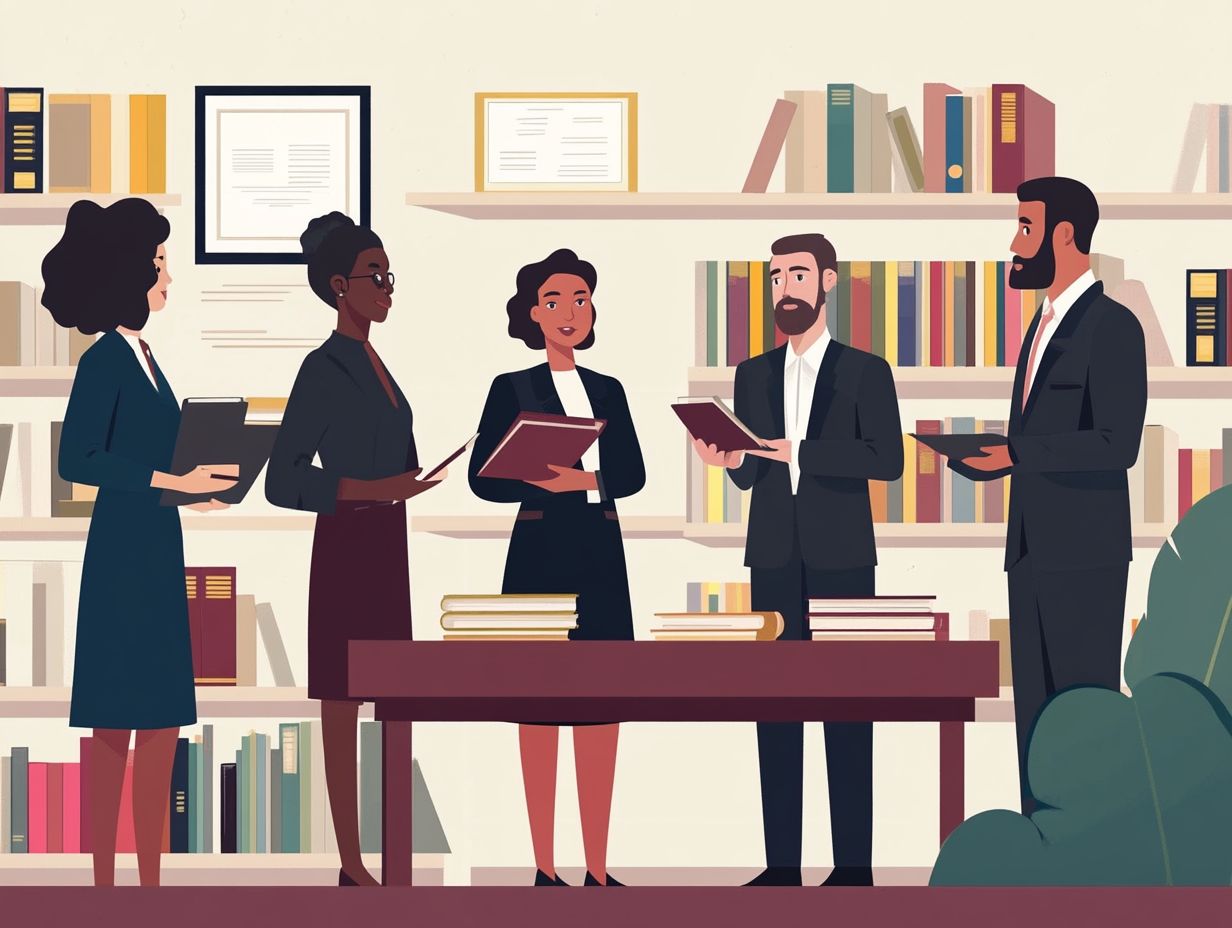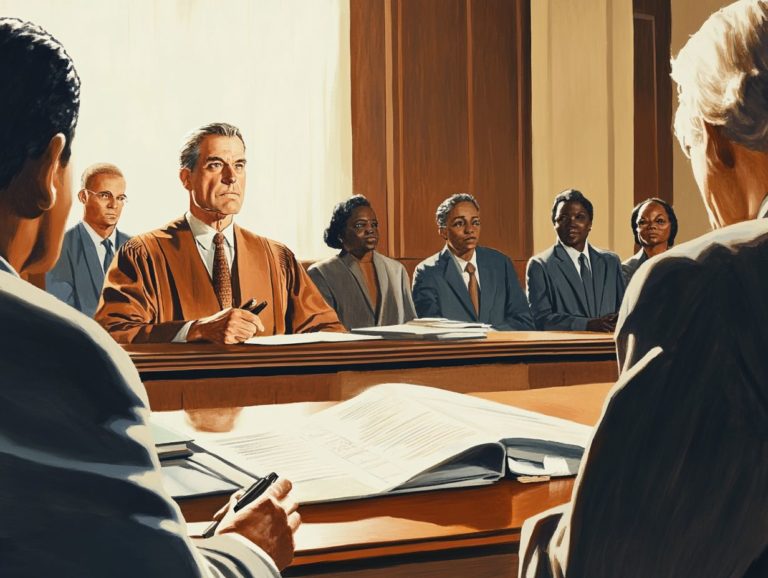Defensive Strategies for Domestic Violence Cases
Domestic violence is a pervasive issue that impacts countless individuals and families, often leaving deep emotional and physical pain.
Grasping its various forms from physical abuse to emotional manipulation is essential for recognizing the signs that someone may be suffering. This article aims to guide you in identifying these indicators, exploring the resources available for support, and outlining the legal options to protect yourself.
You ll also discover proactive measures to raise awareness and prevent future abuse. Engage with us as we shed light on this vital topic and empower those in need.
Contents
- Key Takeaways:
- Understanding Domestic Violence
- Recognizing Signs of Domestic Violence
- Seeking Help for Domestic Violence
- Resources and Support Available
- Defensive Strategies for Domestic Violence Cases
- Preventing Domestic Violence
- Frequently Asked Questions
- What are defensive strategies for domestic violence cases?
- What are the most common defensive strategies used in domestic violence cases?
- How can self-defense be used as a defensive strategy?
- Can lack of evidence be a viable defense?
- How can a defense attorney challenge witness credibility?
- Is a plea bargain an effective strategy?
Key Takeaways:

- Document all instances of abuse for legal purposes.
- Seek help from a professional therapist or counselor.
- Educate yourself on your legal rights and create a safety plan to protect yourself and any children involved.
Understanding Domestic Violence
Understanding domestic violence is crucial for recognizing its complex nature, which extends beyond mere physical violence to include emotional abuse that can leave deep, lasting scars.
In states like Florida, Texas, and Oklahoma, the repercussions of domestic violence can be severe, affecting not just the victims but also the accused.
It s essential for you to grasp the legal processes involved, the protective measures that are available, and the intricate web of accusations that can arise sometimes even involving false allegations that overshadow legitimate cases of abuse.
Defining Domestic Violence and Its Forms
Domestic violence is a broad term that encompasses a range of abuse types, from emotional manipulation to physical violence, impacting individuals within intimate relationships. This pervasive issue can take many forms, whether it s subtle manipulation or overt physical harm, creating an environment steeped in fear and control.
Victims often feel trapped by emotional dependency and societal pressures, which only serve to perpetuate the cycle of abuse. Fortunately, legal protections are in place to safeguard these individuals think restraining orders and domestic violence statutes designed to hold abusers accountable.
For instance, an abuser may face criminal charges such as assault or harassment, which not only threaten their freedom but also carry lasting repercussions for their personal and professional lives.
Awareness and understanding are essential for both victims and communities as they confront this significant social challenge.
Recognizing Signs of Domestic Violence
Recognizing the signs of domestic violence is essential for identifying those who may be enduring emotional or physical abuse. These indicators can appear in numerous ways, from subtle shifts in behavior to evident emotional distress. Being aware of these signs gives you the power to support individuals in need and take meaningful action.
Physical, Emotional, and Behavioral Indicators

Physical violence and emotional abuse often reveal themselves through a range of behavioral indicators, making it essential for you to recognize these signs in order to address the issue effectively.
For example, you might notice someone displaying unexplained bruises or frequent injuries that they try to downplay. This physical distress is often paired with a noticeable shift in their demeanor perhaps they become withdrawn, anxious, or overly compliant to sidestep conflict.
On the emotional side, signs can include heightened sensitivity to criticism or frequent expressions of guilt and shame. Over time, the mental toll can spiral into anxiety disorders, depression, and a pervasive sense of isolation.
Acknowledging these signs is crucial, not only for the individual s physical safety but also for their emotional well-being. Encouraging someone to seek help through support groups or therapy can provide the vital resources they need to regain control and cultivate resilience.
Seeking Help for Domestic Violence
Seeking help for domestic violence is a crucial step for you as a victim. You have access to a wide array of resources and support systems specifically designed to assist you in escaping abusive situations. These resources ensure that your safety and legal rights are upheld, providing you with the necessary tools to reclaim your life.
Resources and Support Available
Many resources and support systems are available for those affected by domestic violence. These include legal representation and community service initiatives that offer assistance and protection.
Organizations like local domestic violence shelters and legal aid societies provide a wealth of comprehensive services. This includes access to attorneys who specialize in domestic violence cases, as well as defensive strategies for fraud cases. These legal experts can guide you through the complexities of securing protective orders, which are vital for your safety.
Community support initiatives offer emotional support and counseling. They also assist with housing, job opportunities, and childcare resources.
Through helplines and advocacy groups, you can find the guidance needed to reclaim control over your life and tap into the diverse support networks available to you.
Defensive Strategies for Domestic Violence Cases
Defensive strategies for domestic violence cases require a sophisticated grasp of the legal options at your disposal. It’s essential to articulate compelling courtroom arguments that consider mitigating factors, including defensive strategies for theft charges. This can significantly enhance your chances of achieving favorable outcomes in court.
Legal Options and Protective Measures

Legal options in domestic violence cases often include pursuing protective measures that are crucial for safeguarding the rights of both victims and the accused during court proceedings. Understanding defensive strategies for hate crimes can also be an important aspect of these legal proceedings.
As a victim, you might seek restraining orders to prevent further contact. This ensures your safety while you navigate the legal landscape. These protective orders can impose restrictions on the accused’s movements and communications, offering you a vital sense of security.
If you find yourself as the accused, it’s essential to know that you have the right to legal representation. A skilled defense attorney can guide you through the complexities of the law, assess the evidence, and advocate on your behalf.
Understanding these dynamics is vital! Everyone deserves fair treatment under the law, so it’s important to know your rights. This allows for a balanced approach to justice and protection for everyone involved.
Preventing Domestic Violence
Preventing domestic violence demands a unified commitment from communities. It’s crucial to emphasize education and awareness, as these elements play a vital role in addressing and mitigating emotional abuse and physical violence before they escalate into serious incidents.
Education and Awareness to Stop Abuse
Education and awareness are essential in the battle against domestic violence. They equip you with the knowledge to recognize the signs of emotional abuse and physical violence. The ultimate aim is to prevent these situations from escalating.
Programs like ‘Love Is Respect’ and ‘The National Domestic Violence Hotline’ are invaluable resources. They help you understand what constitutes a healthy relationship and the subtleties of abusive behaviors. By offering resources, online tools, and training sessions, these initiatives empower you and your community to spot red flags that might otherwise slip under the radar.
Schools and local organizations participating in campaigns like ‘No More’ are initiating vital conversations about consent and respect. These conversations are crucial for shaping the values of future generations. These focused programs have demonstrated their effectiveness not just in raising awareness, but also in motivating survivors to seek help and support. This contributes significantly to the creation of safer environments for all.
Frequently Asked Questions
What are defensive strategies for domestic violence cases?

Defensive strategies for domestic violence cases involve techniques and legal approaches used by defense attorneys to defend clients accused of domestic violence. Understanding common defense strategies can help in disapproving the allegations and preventing or mitigating the potential consequences of a conviction.
Call to Action: If you or someone you know needs help, please reach out to local support services. You are not alone, and there are resources available to assist you.
What are the most common defensive strategies used in domestic violence cases?
Common defensive strategies in domestic violence cases include self-defense, false accusations, lack of evidence, and defensive strategies for drug-related charges.
Defendants might also challenge witness credibility and evidence, claim that the victim’s injuries were caused by something else, or negotiate a plea deal.
How can self-defense be used as a defensive strategy?
Self-defense is a valid strategy when the accused can prove they believed they were in immediate danger, as highlighted in the top 5 defense strategies in criminal cases.
This means they had to use force to protect themselves from harm or even death.
Can lack of evidence be a viable defense?
Yes, if there is insufficient evidence against the accused, it can be a strong defense.
Without enough proof, prosecutors may struggle to build a solid case, leading to dropped charges or an acquittal.
How can a defense attorney challenge witness credibility?
A defense attorney can cross-examine witnesses to highlight any inconsistencies in their statements.
They may also present evidence or witness testimony that contradicts the victim’s account, questioning their reliability.
Is a plea bargain an effective strategy?
Yes, negotiating a plea bargain can be a powerful strategy in domestic violence cases.
This may allow the accused to plead guilty to a lesser charge, resulting in a lighter sentence, especially when evidence against them is strong.






